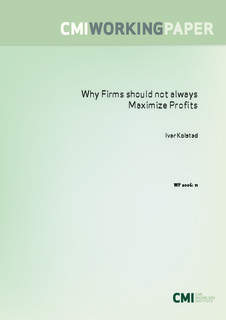| dc.contributor.author | Kolstad, Ivar | |
| dc.date.accessioned | 2008-02-19T08:35:20Z | |
| dc.date.accessioned | 2017-03-29T09:12:49Z | |
| dc.date.available | 2008-02-19T08:35:20Z | |
| dc.date.available | 2017-03-29T09:12:49Z | |
| dc.date.issued | 2006 | |
| dc.identifier.isbn | 82-8062-154-7 | |
| dc.identifier.issn | 0804-3639 | |
| dc.identifier.uri | http://hdl.handle.net/11250/2435944 | |
| dc.description.abstract | Though corporate social responsibility (CSR) is on the agenda of most major corporations, corporate executives still largely support the view that corporations should maximize the returns to their owners. There are two lines of defence for this position. One is the Friedmanian view that maximizing owner returns is the corporate social responsibility of corporations. The other is a position voiced by many executives, that CSR and profits go together. This paper argues that the first position is ethically untenable, while the latter is not supported by empirical evidence. The implication is that there may be good reason for firms to deviate from a maxim of profit maximization. | |
| dc.language.iso | eng | |
| dc.publisher | Chr. Michelsen Institute | |
| dc.relation.ispartofseries | CMI Working paper | |
| dc.relation.ispartofseries | WP 2006: 11 | |
| dc.subject | Profit maximization | |
| dc.subject | Business ethics | |
| dc.subject | Corporate social responsibility | |
| dc.subject | JEL codes: D63, M14 | |
| dc.title | Why firms should not always maximize profits | |
| dc.type | Working paper | |
